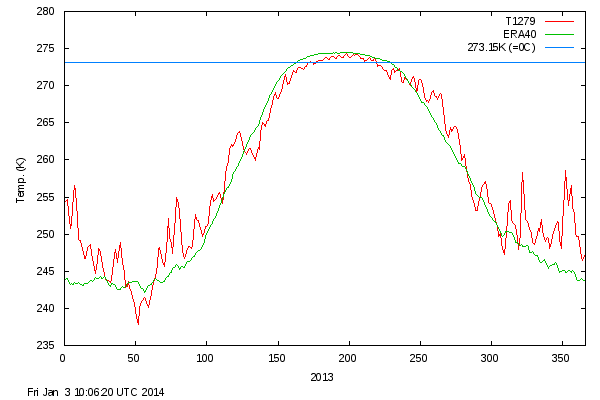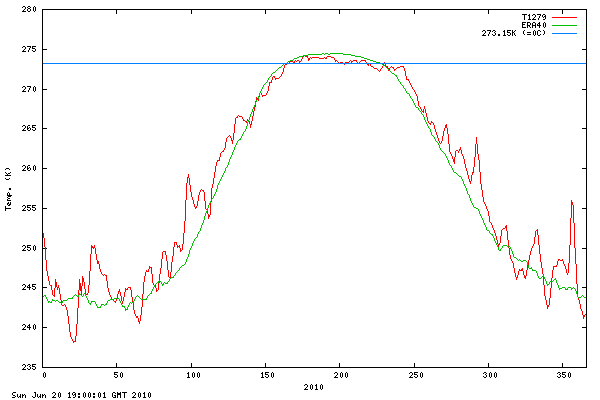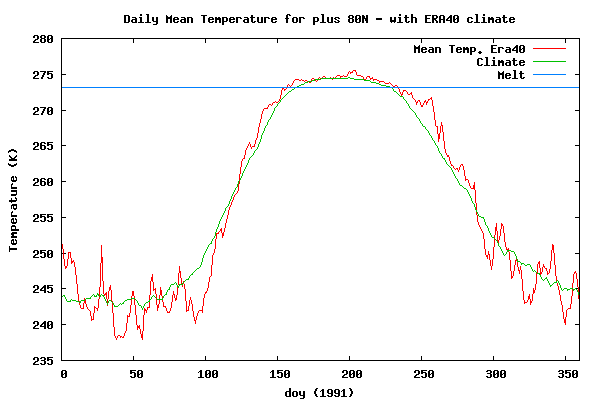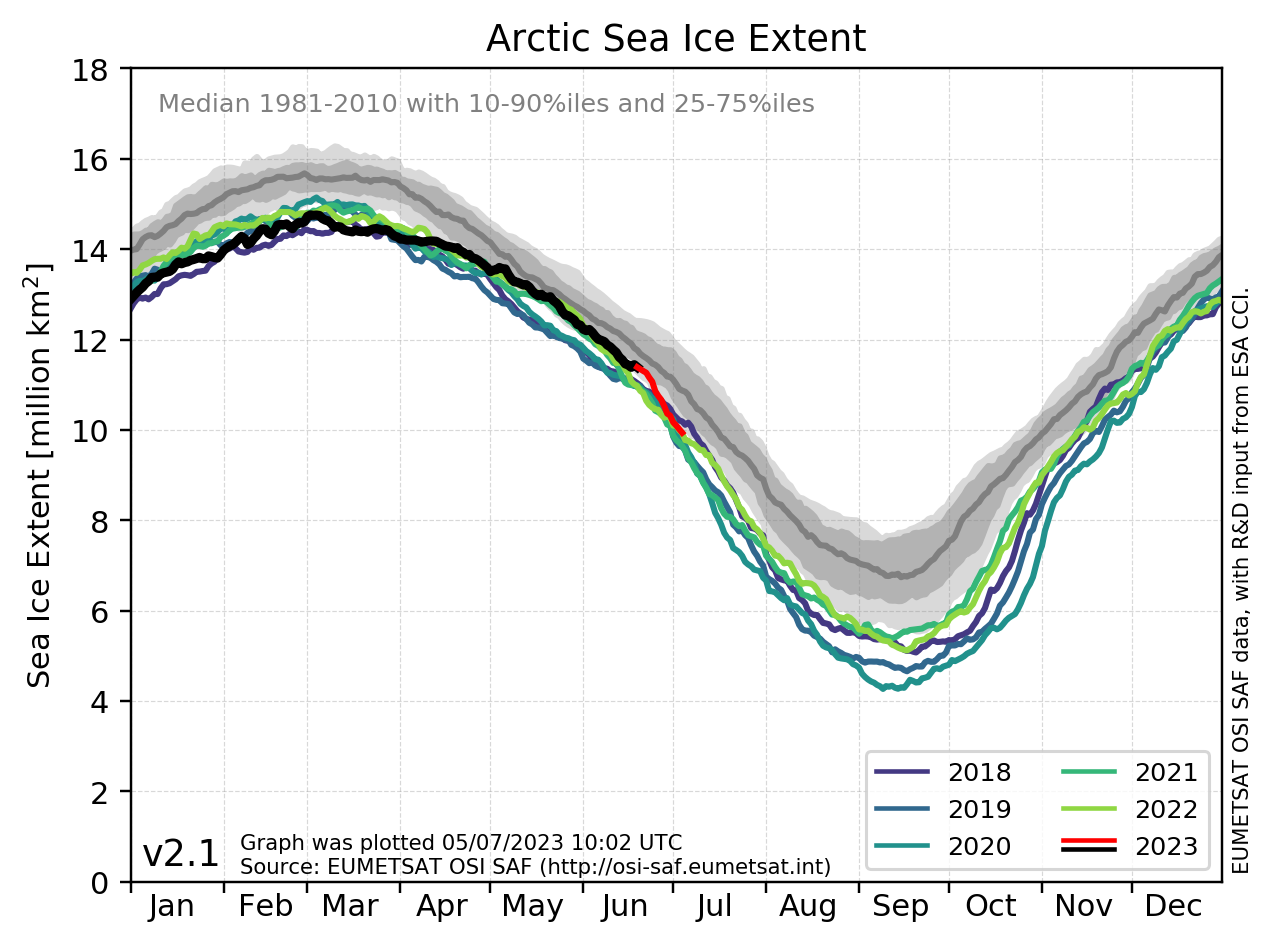Tuesday, August 13, 2013
This Might Be Significant
Hathaway at NASA:

.

And indeed the shift from intenser, shorter cycles to longer/lower cycles does seem to have a high correlation with that mysterious pause in warming which has so embarrassed the UK Met. It is, we are told by so many, utterly mysterious.
Over the longer term, it seems clear that solar activity is not the only contributor to global temperatures:

But yet it also seems to be a factor. Other correlated factors seem to be the Pacific and Atlantic oscillations. Earth temps and the AMO and PDO oscillations are all part of one system. Sunspot cycles are an external influence which may or may not be influencing this system, but certainly cannot be driven by the Earth climate. Solar activity is independent.
One might wonder whether the oscillations themselves have something to do with sunspot cycle/temperature variances over time:

One suspects there may be for the PDO.
Everything here is meaned on 60, to make it all clearer. Hadcrut3 has been added for temps (purple line):
 We have too short a data series to be sure of anything, because picking foreign drivers out of natural oscillations in systems is a hard task. It may be that PDO follows.
We have too short a data series to be sure of anything, because picking foreign drivers out of natural oscillations in systems is a hard task. It may be that PDO follows.
Same thing, meaned over 120 samples:

Looking at these last two graphs, I suspect that temps push PDO, but that changes in sunspot cycle intensities and lengths kind of "shake" AMO, thus suggesting a possible mechanism by which solar cycle changes might have an intensified effect on earth climate (aside from pure energy inputs). What I am hypothesizing is basically that shorter/stronger sunspot cycles insert more energy into the natural Atlantic oscillation, enhancing its swings, and that slower, weaker sunspot cycles dampen the AMO oscillation.
Tisdale's website has a lot of info on AMO and northern latitude warming. I don't have an opinion on causation, but it does seem that high AMO correlates with warmer Arctic.
Normally, AMO seems to go into its high phase and bobble around there for quite some time, meaning that one would expect a warmer Arctic and higher AMO for some years to come (240 sample mean):

But, if my theory is true, the phase shift on the AMO might be more acute because of the shift in sunspot activity, if indeed the lower solar activity persists for several cycles.
This all matters only if you like to eat. There's a huge amount of arable land up in the higher northern hemispheres, but historically northern crop failures have correlated with drops in sunspot cycles.
There is also real debate about whether we are overstating the difference in sunspot cycles due to better observations, which thus overstate recent variability as opposed to historical variability.
There is one thing of which I am certain, and that is that while CO2 should have some temperature effect, the "pure" CO2 effect just can't be that strong. Tropospheric temperatures should be the most sensitive to CO2-caused temperature variations, and look what happened to those when the sunspot cycle shifted:

It may be that CO2 prevents temperatures from falling as fast as they otherwise would, because it is trapping more heat. But it cannot be that CO2 alone has driven all the temperature rise recently, because its effect in the atmosphere is just not suddenly going to change. Lord knows CO2 levels aren't dropping and aren't going to drop any time soon.
In terms of predictions, so far the current people have dropkicked the climate scientists all the way around the globe, and now the solar people are lining up for the next go-round.
And the thing is, folks, that it's been a cold summer in the Arctic:

But what's odd about this is that we are pretty much at solar maximum. If you go to the website from which I thieved the graph, you discover that you can flip back and look at Arctic temps since 1958.
2009/2010 was the last solar minimum:

It was cold. You can plot all sorts of climate series at ESRL NOAA. So I did:

Purely out of random curiosity, I thought I'd use the first website to see if there was any pattern in summer Artic temperatures between sunspot maximums and minimums. And you know, there did seem to be a small but persistent effect. Try it yourself.
But this year, it's darned cold up there at solar maximum:

Which looks quite different from the last biggie, 1991:

All of which made me wonder if maybe it's time to stop hoarding gold, and start hoarding pasta?
And no, the Arctic is not exactly a lake this year:

At this point, if he were alive my father would be in fits of laughter, cheerfully reminding us all that he had always said that in terms of reliability between the sciences, geology came first, followed by physics. Sociology dead last. Yes, Dad, you were right - but I think we have a new contestant for dead last in climate science.
Although I do not know what it all means, I suspect that investing in farmland in Canada is not the wisest strategy.

We are currently over four years into Cycle 24. The current predicted and observed size makes this the smallest sunspot cycle since Cycle 14 which had a maximum of 64.2 in February of 1906There has historically been a high correlation between changes in sunspot cycle lengths and intensities and US global temperatures. Five years ago I played with all the available numbers and came up with a three to five year lagged effect:
.
And indeed the shift from intenser, shorter cycles to longer/lower cycles does seem to have a high correlation with that mysterious pause in warming which has so embarrassed the UK Met. It is, we are told by so many, utterly mysterious.
Over the longer term, it seems clear that solar activity is not the only contributor to global temperatures:
But yet it also seems to be a factor. Other correlated factors seem to be the Pacific and Atlantic oscillations. Earth temps and the AMO and PDO oscillations are all part of one system. Sunspot cycles are an external influence which may or may not be influencing this system, but certainly cannot be driven by the Earth climate. Solar activity is independent.
One might wonder whether the oscillations themselves have something to do with sunspot cycle/temperature variances over time:
One suspects there may be for the PDO.
Everything here is meaned on 60, to make it all clearer. Hadcrut3 has been added for temps (purple line):
Same thing, meaned over 120 samples:
Looking at these last two graphs, I suspect that temps push PDO, but that changes in sunspot cycle intensities and lengths kind of "shake" AMO, thus suggesting a possible mechanism by which solar cycle changes might have an intensified effect on earth climate (aside from pure energy inputs). What I am hypothesizing is basically that shorter/stronger sunspot cycles insert more energy into the natural Atlantic oscillation, enhancing its swings, and that slower, weaker sunspot cycles dampen the AMO oscillation.
Tisdale's website has a lot of info on AMO and northern latitude warming. I don't have an opinion on causation, but it does seem that high AMO correlates with warmer Arctic.
Normally, AMO seems to go into its high phase and bobble around there for quite some time, meaning that one would expect a warmer Arctic and higher AMO for some years to come (240 sample mean):
But, if my theory is true, the phase shift on the AMO might be more acute because of the shift in sunspot activity, if indeed the lower solar activity persists for several cycles.
This all matters only if you like to eat. There's a huge amount of arable land up in the higher northern hemispheres, but historically northern crop failures have correlated with drops in sunspot cycles.
There is also real debate about whether we are overstating the difference in sunspot cycles due to better observations, which thus overstate recent variability as opposed to historical variability.
There is one thing of which I am certain, and that is that while CO2 should have some temperature effect, the "pure" CO2 effect just can't be that strong. Tropospheric temperatures should be the most sensitive to CO2-caused temperature variations, and look what happened to those when the sunspot cycle shifted:
It may be that CO2 prevents temperatures from falling as fast as they otherwise would, because it is trapping more heat. But it cannot be that CO2 alone has driven all the temperature rise recently, because its effect in the atmosphere is just not suddenly going to change. Lord knows CO2 levels aren't dropping and aren't going to drop any time soon.
In terms of predictions, so far the current people have dropkicked the climate scientists all the way around the globe, and now the solar people are lining up for the next go-round.
And the thing is, folks, that it's been a cold summer in the Arctic:

But what's odd about this is that we are pretty much at solar maximum. If you go to the website from which I thieved the graph, you discover that you can flip back and look at Arctic temps since 1958.
2009/2010 was the last solar minimum:

It was cold. You can plot all sorts of climate series at ESRL NOAA. So I did:

Purely out of random curiosity, I thought I'd use the first website to see if there was any pattern in summer Artic temperatures between sunspot maximums and minimums. And you know, there did seem to be a small but persistent effect. Try it yourself.
But this year, it's darned cold up there at solar maximum:

Which looks quite different from the last biggie, 1991:

All of which made me wonder if maybe it's time to stop hoarding gold, and start hoarding pasta?
And no, the Arctic is not exactly a lake this year:

At this point, if he were alive my father would be in fits of laughter, cheerfully reminding us all that he had always said that in terms of reliability between the sciences, geology came first, followed by physics. Sociology dead last. Yes, Dad, you were right - but I think we have a new contestant for dead last in climate science.
Although I do not know what it all means, I suspect that investing in farmland in Canada is not the wisest strategy.
Comments:
<< Home
Have you ever tried doing finite element analysis of heat transfer equations with dynamic forcing functions in 3D? I have, and it's essentially impossible without making an enormous number of boundary assumptions. You end up having to linearize so many terms that the simulation is near-useless without detailed real-world validation of the boundary equations.
In other words, you have to know how the system behaves PRIOR to constructing a model of it. The simulation is not predictive.
The climate models are very similar equations to a basic heat-transfer model, and they have the same problems. That's what they're talking about when they discuss things like the "water vapor feedback" constant. In order to get their models to converge, they had to take complicated multiple-order differential equations and represent them with a CONSTANT!
A model like that is absolutely worthless without extensive validation by real-world data. Otherwise, you're just taking your prior misconceptions and baking them into the constants in the first place. In my uncharitable moments, I think that was a feature, not a bug, of climate science.
In other words, you have to know how the system behaves PRIOR to constructing a model of it. The simulation is not predictive.
The climate models are very similar equations to a basic heat-transfer model, and they have the same problems. That's what they're talking about when they discuss things like the "water vapor feedback" constant. In order to get their models to converge, they had to take complicated multiple-order differential equations and represent them with a CONSTANT!
A model like that is absolutely worthless without extensive validation by real-world data. Otherwise, you're just taking your prior misconceptions and baking them into the constants in the first place. In my uncharitable moments, I think that was a feature, not a bug, of climate science.
Keep at it Mama, YOU are not maxed out yet.
I think sociology lags climate predication which lags economics. I'm not trying to be rude to you, but generally economists have not done a sterling job, present company excepted.
I think sociology lags climate predication which lags economics. I'm not trying to be rude to you, but generally economists have not done a sterling job, present company excepted.
Keep at it Mama, YOU are not maxed out yet.
I think sociology lags climate predication which lags economics. I'm not trying to be rude to you, but generally economists have not done a sterling job, present company excepted.
I think sociology lags climate predication which lags economics. I'm not trying to be rude to you, but generally economists have not done a sterling job, present company excepted.
WSJ - I've looked at it, but correlation is not causation. It's a theory, which may in fact be debunked 15 years down the line. A few years ago we had very nice curves aligning temps and rising CO2.
Two other things bother me about it. He's concentrating on stratospheric temps esp. in the Antarctic, but most warming seems to have been observed in the north,
SH cooler than NH.
And he's using a fudge factor to remove the solar influence. There's a lot of debate about the solar influence. That of course makes it a great candidate for a flexible fudge factor, but one suspects that the bridge of conjecture thus constructed may not be able to withstand natural turbulence. Now of course if you are a tenured professor, natural turbulence does not effectively exist, so I understand why he has such confidence in his theory.
Finally, some weird squirming occurs in the bottom of my stomach when anyone comes up with that close a correlation. I feel as if someone's just trotted up and offered me some really good real estate deals in Fukushima prefecture if I will just eat a jellied eel on a Japanese contestant show.
Instinct rebels, and I feel impelled to decline the kind offer. I have no proper attire for a Japanese game show, because when I emailed the shop assistant to send me the $38,000 handbag so that I could see if I liked it, she cruelly refused. I know it was due to the fact that I'm getting some gray hairs at the temples. Thus age discrimination is the only thing standing between me and my future as a Fukushima real estate mogul.
If you give me enough time and a decent ration of dark chocolate, I'm pretty sure I could come up with some nice correlations between global temperatures and various political initiatives. It is true that a few inane carping critics such as Snarky Mark, Neil and yourself might claim these trends could not possibly be related by cause. I'd get Krugman to write the response, because nobody huffs and puffs as well as he and HE HAS A NOBEL PRIZE. That also trumps natural turbulence.
This is not an empty threat. For example, I can produce a beautiful theory with lots of pretty convincing graphs about how aspects of mortgage lending in the US control the sunspot cycle. The only thing stopping me from whipping one up right now is that there is no chocolate in the domicile (a deliberate self-control measure) and that I found Foucault's Pendulum a really terrifying novel, because I thought it was accurate in what it said about humans. The White Queen has already dominated too much of human history for my liking.
Two other things bother me about it. He's concentrating on stratospheric temps esp. in the Antarctic, but most warming seems to have been observed in the north,
SH cooler than NH.
And he's using a fudge factor to remove the solar influence. There's a lot of debate about the solar influence. That of course makes it a great candidate for a flexible fudge factor, but one suspects that the bridge of conjecture thus constructed may not be able to withstand natural turbulence. Now of course if you are a tenured professor, natural turbulence does not effectively exist, so I understand why he has such confidence in his theory.
Finally, some weird squirming occurs in the bottom of my stomach when anyone comes up with that close a correlation. I feel as if someone's just trotted up and offered me some really good real estate deals in Fukushima prefecture if I will just eat a jellied eel on a Japanese contestant show.
Instinct rebels, and I feel impelled to decline the kind offer. I have no proper attire for a Japanese game show, because when I emailed the shop assistant to send me the $38,000 handbag so that I could see if I liked it, she cruelly refused. I know it was due to the fact that I'm getting some gray hairs at the temples. Thus age discrimination is the only thing standing between me and my future as a Fukushima real estate mogul.
If you give me enough time and a decent ration of dark chocolate, I'm pretty sure I could come up with some nice correlations between global temperatures and various political initiatives. It is true that a few inane carping critics such as Snarky Mark, Neil and yourself might claim these trends could not possibly be related by cause. I'd get Krugman to write the response, because nobody huffs and puffs as well as he and HE HAS A NOBEL PRIZE. That also trumps natural turbulence.
This is not an empty threat. For example, I can produce a beautiful theory with lots of pretty convincing graphs about how aspects of mortgage lending in the US control the sunspot cycle. The only thing stopping me from whipping one up right now is that there is no chocolate in the domicile (a deliberate self-control measure) and that I found Foucault's Pendulum a really terrifying novel, because I thought it was accurate in what it said about humans. The White Queen has already dominated too much of human history for my liking.
DocJim - if you would be willing to discuss a few small medical issues please email me at maxedoutmama2 @ gmail.com
No pressure, though, if you don't feel like it.
In particular, I would like to ask you if you have ever seen a patient similar to one SuperDoc is managing. He's doing very well, but we don't understand why it is working so well. There's way too much of "and then a miracle happened" about this one.
As for economics, I think it can only be called a science when it is used as a very weak discipline. The sum of the unknowns generally vastly outweighs the sum of the knowns, and macroeconomics has failed to discipline itself in a rather striking manner.
At this point it is an academically dominated discipline that tends to veer into different flavors of mathematical fantasy.
No pressure, though, if you don't feel like it.
In particular, I would like to ask you if you have ever seen a patient similar to one SuperDoc is managing. He's doing very well, but we don't understand why it is working so well. There's way too much of "and then a miracle happened" about this one.
As for economics, I think it can only be called a science when it is used as a very weak discipline. The sum of the unknowns generally vastly outweighs the sum of the knowns, and macroeconomics has failed to discipline itself in a rather striking manner.
At this point it is an academically dominated discipline that tends to veer into different flavors of mathematical fantasy.
Well,that's the rub, MOM. It'll likely take decades of additional observation to get enough data to really test hypotheses. We only have about 3 decades of global satellite data, and that's clearly not enough to draw conclusions. In the meantime, the grant-hustlers will continue pushing solutions that may be more damaging than the disease.
WSJ: Yup - and there is no real science without data.
The metaphysics of climate are interesting, but the frustration is that you just have to wait for decades and see. It's not that we haven't learned a lot, but rather that we haven't gotten to the point where the knowledge is all that useful.
Post a Comment
The metaphysics of climate are interesting, but the frustration is that you just have to wait for decades and see. It's not that we haven't learned a lot, but rather that we haven't gotten to the point where the knowledge is all that useful.
<< Home
 MaxedOutMama
MaxedOutMama

